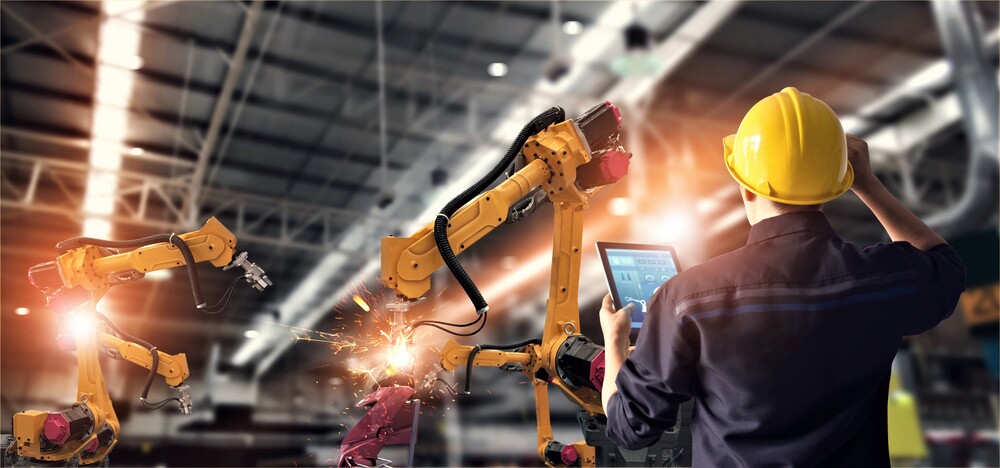How Automation Can Save Manufacturers Time, Eliminate Errors, and Reduce Costs
In the world of manufacturing, it’s critical that every moving part operates at maximum efficiency like a well-oiled machine.
But when humans are tasked with completing repetitive, time-consuming tasks, this often slows down processes, creates errors, and leads to costly inefficiencies.
Fortunately, there is a cost-effective way to relieve these pain points while improving productivity, lowering costs, and reducing operating risks.
The solution? Robotic Process Automation, also known as RPA.
What is RPA?
In the simplest of terms, RPA is a technology that uses software to perform business processes traditionally performed by humans. In reality, RPA is a bit more complex.
RPA works by programming “bots” to perform repetitive, time-consuming tasks that are prone to errors and wasted time when performed by humans. It is a core component of Hyperautomation, which blends RPA, Machine Learning and Artificial Intelligence (AI) together in order to automate as many processes as possible.
By implementing RPA technology, numerous different processes can be completed without errors at a fraction of the time and at a lower cost.
Below, we will examine the numerous benefits of RPA in a bit more depth.
Benefits of RPA
Tasks Are Completed More Quickly
The value of RPA bots is that they are not human, and can operate at much higher speeds. For instance, bots can complete a task in just minutes that would otherwise take a human employee hours to perform.
Bots are also not limited to a 9-5 schedule, do not require breaks or sleep, and don’t take vacations. This means bots can continue operating at maximum efficiency 24/7.
Reduced Operating Risk
No matter how skilled or experienced your manufacturing team is, humans are naturally prone to errors from time to time. When it comes to dull, repetitive processes, the risk of error is further heightened.
Because RPA bots are not human, they don’t get bored or tired, and make far fewer errors compared to humans.
Reduced Overhead Costs
It’s estimated that when RPA bots are deployed to perform various tasks within your organization, overhead costs can be reduced by around 40-70% per business process.
The reason for this is that RPA eliminates the need for excess staff to perform processes manually.
Manufacturing Processes That Can be Automated Using RPA
There are numerous ways RPA can streamline manufacturing and make your day-to-day operations significantly more efficient.
The following are just a few examples of ways RPA bots can be deployed within your manufacturing department.
Invoices
Invoicing is a crucial component of every single business, as it ensures you get paid and has a direct impact on your bottom line.
But when invoicing processes are performed manually, it can become a liability and lead to costly human errors as you start to scale. RPA offers a solution to this predicament, as bots can be programmed to take care of any invoice-related task without errors.
That being said, RPA can be used to automate the following invoicing processes:
- Invoice Data Capture
- Updating invoices in ERP
- Invoice Creation
- Invoice Processing

Managing Inventory
An essential component of any manufacturing division is keeping inventory of your products and ensuring that the right amount of products are being manufactured, shipped out, etc. That being said, this can be incredibly taxing on your human staff and often leads to significant errors.
To avoid this, manufacturing teams can implement RPA technology and deploy RPA bots to carry out the following functions:
- Inventory auditing
- ERP Reporting
- Goods Inventory
- Raw Material Inventory
Data
Sorting, analyzing, and processing data is another tedious task made even more challenging when handled manually by humans.
For instance, when data sets are saved in multiple different formats across several
locations and are being accessed by different members of your staff, data becomes incredibly difficult to not only sort through but analyze and draw important insights.
With RPA technology implemented, bots can be programmed to carry out the following functions:
- Data Gathering & Posting
- Process Data Consolidation
- Posting transactions
Financials
Handling sensitive financial documents requires a lot of special care to avoid mistakes that can be costly for your business. While your small financial department may have no issue handling everything in the beginning, as you start to scale, it can become unmanageable, costing your business time and money.
If your financial team has become overloaded, RPA bots can be deployed to handle the following tasks to relieve the burden from your human staff:
- Financial reporting
- Book Closures
- Credit Assessment Reports
- Bank Reconciliation Process
- Drawback Fund Transfer
- Tax Reconciliations
Want to Learn More About RPA?
As you can see, RPA has the power to fully transform the manufacturing industry and make everyday business processes significantly more efficient. Interested in seeing it for yourself? Get in touch with our team of RPA experts today.
Our goal is to ensure your team is fully supported and empowered to use RPA in a way that helps your business reach its full potential – no matter the industry.
